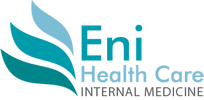As per the Centers for Disease Control, everyone present in healthcare facilities should continue to wear masks. The ENIHEALTHCARE appreciates your cooperation.
High Cholesterol Specialist
Cholesterol is needed to build healthy cells. But high levels of cholesterol can lead to fatty deposits in the blood vessels making it difficult for enough blood to flow through your arteries and increase your risk of heart diseases such as heart attack and stroke. High cholesterol can be inherited, but it’s often the result of unhealthy lifestyle choices, which make it preventable and treatable. A healthy diet, regular exercise and sometimes medication can help reduce high cholesterol. Blood test is used for detection and the frequency of testing is dependent of the patient’s health and family history. High cholesterol can cause a dangerous accumulation of cholesterol and other deposits on the walls of your arteries (atherosclerosis). These deposits (plaques) can reduce blood flow through your arteries, which can cause complications. Our Team at ENIHEALTHCARE will review your health history and order the lab work for the diagnosis.
What causes high cholesterol?
Factors you can control — such as inactivity, obesity, and an unhealthy diet — contribute to harmful cholesterol and triglyceride levels. Factors beyond your control might play a role, too. For example, your genetic makeup might make it more difficult for your body to remove LDL cholesterol from your blood or break it down in the liver. Some other Medical conditions or medications can cause unhealthy cholesterol levels.
There are different types of cholesterol:
- Low-density lipoprotein (LDL).LDL, the “bad” cholesterol, transports cholesterol particles throughout your body. LDL cholesterol builds up in the walls of your arteries, making them hard and narrow.
- High-density lipoprotein (HDL).HDL, the “good” cholesterol, picks up excess cholesterol and takes it back to your liver.
A lipid profile also typically measures triglycerides, a type of fat in the blood. Having a high triglyceride level also can increase your risk of heart disease.
WHAT ARE THE RISK FACTORS IF I HAVE HIGH CHOLESTROL?
Factors that can increase your risk of unhealthy cholesterol levels include:
- Poor diet. Eating too much saturated fat or trans fats can result in unhealthy cholesterol levels. Saturated fats are found in fatty cuts of meat and full-fat dairy products. Trans fats are often found in packaged snacks or desserts.
- Having a body mass index (BMI) of 30 or greater puts you at risk of high cholesterol.
- Lack of exercise. Exercise helps boost your body’s HDL, the “good,” cholesterol.
- Cigarette smoking may lower your level of HDL, the “good,” cholesterol.
- Drinking too much alcohol can increase your total cholesterol level.
- As you age, your liver becomes less able to remove LDL cholesterol.
HOW IS HIGH CHOLESTROL TREATED?
Lifestyle changes such as exercising and eating a healthy diet are the first line of defense against high cholesterol. But, if you have made these important lifestyle changes and your cholesterol levels remain high, your doctor might recommend medication.
The choice of medication or combination of medications depends on various factors, including your personal risk factors, your age, your health, and possible drug side effects. Our Team at ENIHEALTHCARE will collaborate with you on the best treatment plan. Call us or Book your appointment online to initiate your way to a healthier thriving lifestyle management.
ENIHEALTHCARE has a diverse team of professionals that provide a friendly and welcoming environment along with excellent care for you, your family and associates.
Useful Links
Office Hours
Monday – Friday
7:30am – 5pm
Saturday – Sunday OFF
Location
9319 Pinecroft Drive
Suite 120 The Woodlands
Texas 77380

